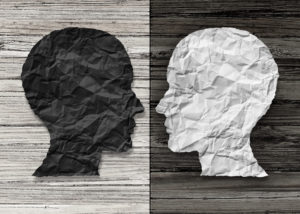Substance abuse and mental illness often coincide, and treating them separately can be unproductive for those in recovery. For this reason, we at Northbound Treatment believe in addressing both issues as part of a comprehensive drug or alcohol rehab program.
Roughly half of those suffering from a mental health disorder also struggle with substance abuse. Similarly, more than half of people with drug addictions have at least one mental health disorder [1]. The prevalence of co-occurring disorders and substance abuse is why, for many individuals, dual diagnosis treatment is vital to recovery.
But what is dual diagnosis, exactly, and how is it implemented into drug and alcohol treatment programs? The dedicated team at Northbound is here to answer all your questions. Find the dual diagnosis definition below, as well as a detailed breakdown of what you can expect from treatment.
Dual Diagnosis Definition
Sometimes called “co-occurring disorders” or “comorbidity,” a dual diagnosis disorder is when more than one illness or condition is present at the same time[2]. The term is most often used to describe someone struggling with alcoholism or drug addiction in addition to a mental health condition.
Without a comprehensive rehab program, co-occurring conditions can inhibit recovery and even worsen an existing disorder. Dual diagnosis treatment recognizes the interconnectedness of substance abuse and mental illness and emphasizes the urgency of addressing them at the same time.
Dual diagnosis is a relatively new concept that was first defined in the 1980s[3]. With unsatisfactory success rates of treating mental health and substance abuse separately, the National Institute of Mental Health (NIMH) and the National Institute of Drug Abuse (NIDA) started recommending individuals receive integrated treatment to address both mental health and substance abuse[3].
Types of Co-Occurring Mental Health Disorders
With a long list of illicit and prescription drugs in the world, several types of substance abuse disorders, and a wide range of diagnosable mental health conditions, there are practically endless types of co-occurring mental health disorders. That said, some are more common than others.
Some of the most common dual diagnosis examples include:
- Anxiety and benzodiazepines
- Bipolar disorder and alcoholism
- Codependency and alcohol use disorder
- Depression and alcohol abuse
- Eating disorders and substance abuse
- PTSD (post-traumatic stress disorder) and opioids
- Stress and substance abuse
- Trauma and drug alcohol addiction
Northbound Treatment’s dual diagnosis program is designed to address each of the examples above, as well as virtually any other co-occurring disorders.
Why Are Co-Occurring Disorders So Common?
According to the 2018 National Survey on Drug Use and Health by the Substance Abuse and Mental Health Services Administration (SAMHSA), upwards of 9 million adults in the U.S. suffered from both a severe mental illness and substance abuse disorder within the past year. Also, the rates of dual diagnosis in 2017 and 2018 were up from the previous two years[4].
One of the most remarkable takeaways from SAMHSA’s survey is that substance abuse and addiction were more common among people with a mental health condition than those without one. For instance, about 32% of adults with a mental illness participated in binge drinking in the past month compared to roughly 25% without a diagnosed condition. Additionally, nearly half of those with a severe mental illness abused illegal drugs, whereas only 16% of adults without a mental health condition used illicit substances[4].
While a psychological disorder and substance addiction often goes hand in hand, it can be difficult to determine which appeared first. In some cases, a severe substance abuse problem can lead to mental illness, as many cognitive conditions make a person more prone to addiction. Yet in other instances, people use drugs or alcohol to cope with mental turmoil.
Still, one is not necessarily the result of the other. So, why are co-occurring disorders so common? A few risk factors are associated with both mental illness and substance abuse disorder. This includes trauma, chronic stress, and genetics[5]. Trauma and stress are environmental triggers that often lead people to self-medicate or attempt to escape reality with drugs and alcohol. With a genetic predisposition to substance addiction or mental illness, an individual will be more likely to suffer from either or both conditions.
Why Dual Diagnosis Treatment is Crucial for Rehab
Dual diagnosis treatment is an evidence-based approach to drug and alcohol rehab with substantial research supporting its effectiveness. However, only about half of those with co-occurring disorders got treatment for either of their conditions in 2018, and only 5% received care for both[4].
The main reason behind this is that many mental healthcare providers aren’t equipped to treat addiction, and a lot of rehab programs aren’t designed to address mental illness. Managing an addiction or mental health treatment program at multiple facilities can be challenging, especially for those trying to get sober.
Not only that, but without a single comprehensive program that takes all factors into account, many critical details fall through the cracks. Multiple healthcare providers may have a tough time getting a complete and accurate picture of a person’s health, making it hard to identify the root cause of a condition. And even if they’re aware of a co-occurring disorder, there’s a good chance they lack the qualifications to treat it on their own.
Substance abuse can complicate mental health therapy if it’s not addressed simultaneously, and vice versa. If addiction is present, any progress made in a single diagnosis treatment program has a high risk of being erased. Also, many people are timid about disclosing a mental illness or substance abuse habits, even to health professionals. That’s why it’s important to create a judgment-free environment that encourages clients to share all aspects of their mental, physical, and behavioral health.
By acknowledging all circumstances and conditions contributing to addiction instead of separating each issue or assuming it will be addressed elsewhere, individuals are often more successful at getting clean. Ultimately, a dual diagnosis treatment program helps clients overcome drug and alcohol abuse while identifying real-life triggers, developing practical coping mechanisms, achieving long-term sobriety, and finding fulfillment in a sober lifestyle.
How Dual Diagnosis Treatment Works
How does co-occurring disorders treatment cover all the bases for mental health and substance abuse? The key to this integrated treatment approach is a diverse range of clinicians, therapists, and counselors who work together on helping an individual address every component of their addiction.
At Northbound Treatment, each dual diagnosis patient undergoes an initial evaluation that assesses the nature of their addiction, their personal history, and their current lifestyle, as well as their mental, physical, and emotional state. We’ll then work with you on developing a personalized treatment plan that takes all of these factors into account. Clients are assigned a dedicated care team who will provide support, guidance, and accountability at every step of recovery.
At a dual diagnosis rehabilitation center, you’ll receive substance abuse treatment along with care for your psychiatric disorder. The length and intensity of psychiatric services depend on the severity of your addiction and mental health condition and your progress throughout treatment. The flexible treatment programs from Northbound are created on a case-by-case basis, and they can be adjusted at any time if something isn’t working.
Insurance Coverage for Dual Diagnosis Treatment
Thanks to the Mental Health Parity and Addiction Equity Act and expansions from the Affordable Care Act (ACA), insurance providers are legally required to cover care for mental health and substance abuse services. Both are now classified as essential healthcare, meaning you don’t have to reach your deductible in order for your coverage to kick in.
Also, the Family and Medical Leave Act (FMLA) requires employers to allow employees to take time off work for medical reasons. What many don’t realize is that this includes a dual diagnosis program at a residential rehab facility. If you need to leave work to get treatment for co-occurring disorders, you’re entitled to up to 12 weeks of unpaid medical leave each year. Essentially, this means you can’t be fired for taking time off for treatment.
If you’re not sure what’s covered under your insurance policy, Northbound Treatment is here to help. Fill out our insurance verification form, and one of our specialists will review your information and provide you with a breakdown of your options. Not only that, but we’ll advocate for you and handle the back-and-forth with your insurance company to help you get the most out of your coverage.
Are you or a loved one struggling with addiction and a co-occurring mental health condition? We encourage you to reach out to Northbound Treatment as soon as possible. Call us at (888) 978-8649 today.
External sources:
- https://www.ncbi.nlm.nih.gov/pmc/articles/PMC2200799/
- https://www.drugabuse.gov/sites/default/files/rrcomorbidity.pdf
- https://www.ncbi.nlm.nih.gov/pmc/articles/PMC2880934/
- https://www.samhsa.gov/data/sites/default/files/cbhsq-reports/NSDUHNationalFindingsReport2018/NSDUHNationalFindingsReport2018.pdf
- https://www.dartmouth.edu/eap/library/dualdiagnosis1.pdf
Author
-

President, CEO & Founder at Northbound Treatment Network
Paul Alexander is the CEO, President & Founder of Northbound Treatment Network in Newport Beach, California. He believes wholeheartedly in transformational leadership, organizational health and effective, fully integrated substance use disorder and mental health treatment. With over 27 years of experience in behavioral healthcare, Paul has extensive knowledge of “in vivo” treatment modalities, clinical development, operations, strategy, marketing and financial planning. He has been widely recognized for his development of collegiate-based residential treatment programs for students in recovery and authored a research study at The University of California confirming this modality’s effectiveness.
Paul’s comprehensive professional experience, willingness to innovate, and emphasis on organizational health are vital factors in Northbound’s continued success. Paul received his Certified Addiction Treatment Specialist training at Saddleback College in Mission Viejo, CA, and was awarded Outstanding Alumni Service Award in 2002. Paul holds a Bachelor of Arts degree in Criminology, Law and Society, Summa Cum Laude, from University of California, Irvine, and a Juris Doctorate degree from Loyola Law School of Los Angeles. Paul currently serves on The National Association of Addiction Treatment Providers (NAATP) board. In addition, he serves on The Family Recovery Foundation board and The CarePossible board in Orange County; both organizations are committed to raising funds for family recovery and treatment for former military personnel. Paul is in recovery himself and lives in Orange County with his wife Silvana and his two young sons, Noah and Dean.










